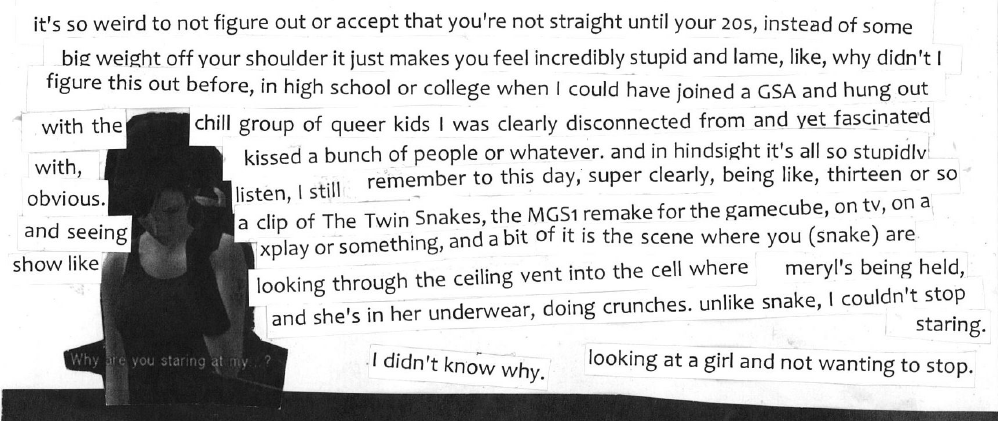
Regardless of the arguments about whether Ladykiller in a Bind does what it says on the tin, effectively or even at all, a really important thing I think it makes explicit is making the lead of a game that roughly fits in the dating sim genre a cross-dressing woman. While discussing what I found interesting about the game’s structure and premise I realized that a lot of what game studies tends to call “cross-” or “trans-” gender play focuses on games where you can create your character, or where men choose to play as women, sometimes both at the same time.
(I shy away from calling it “trans” gender play myself as I’m not trans and feel like the activity is generally closer to cross-dressing anyways.)
And I guess there’s a pretty clear logic behind the fascination… that the default game character is a man is a given usually or at least has been for most of the history of games being made and the social status of women is just, you know, not as tough! not as cool! so why would a guy ever want to play as a girl? (Insert grade-school eww face here)
But really if it counts one way around shouldn’t it count the other way too? When theorists see girls and women playing as male characters, if they see it at all, it’s as a problem to be fixed, as in, oh, they’re only doing that because there’s not enough Girl Games, rather than investigating the affect and motivation of playing as a boy. I remember very matter-of-factly deciding which bachelorette to pursue in my first Harvest Moon game. At that point the idea of playing as a girl was just a rumor around the edges of the online forums, Japan might be making a version where you could do it but it certainly wouldn’t get translated.
I picked Karen because the man she otherwise ended up with seemed irritating and ill-matched to her. At the time I was in middle school and didn’t really have a sense of sexuality beyond of course I’ll get married to a man one day that’s what women do and so it seemed like a neutral, practical choice but it’s a situation that’s echoed in my adult life since. (Haw, haw.) I’m also reminded of the hours spent a few years later unspooling every pathway of a creepy 3DCGI porn hypertext novel, telling myself my interest was purely structural. Jokes aside, obviously women who both know and don’t know about their same sex attraction yet have played games as men where they can romance women for years as both indulgence and exploration, and Ladykiller in a Bind shifts that from it’s usual position as an unintended and unaddressed community of players to the actual in-game protagonist. Intentional or not I think it fits nicely with several other things the game does that are not outright critiques but little winks and digs about the visual novel as a form.

I also write about my first sense that something about how I looked at women was potentially wrong or unusual coming from a video game in my Metal Gear Solid zine, and this is why discussions of fanservice and women in games are always challenging for me. On the one hand I see that these camera angles, Solid Snake as the ceiling voyeur as Meryl does crunches in her undies among thousands more examples are essentially emulating the misogynistic eye of popular cinema that’s been written about and analyzed for years. Nothing new really. On the other hand, playing as a boy, or being a tomboy who’s glued to the Street Fighter II cabinet in your church’s youth centre is a sort of safe space to enjoy looking at cute or tough or pretty girls while your brain is still working this shit out.
I’m suspicious of the implication that I’d inherently enjoy or relate to a game with a merely female protagonist more, or that playing as a man when I don’t have the choice 90% of the time has me worse off because it’s just as impossible for me to conceptualize being a straight woman as it is a straight man, I think. And I also think these sort of studies when done unreflectively and without considering things the other way around have a tendency to go into the eternal Problem Zone of Game Studies which is of course, a vast overstatement of the qualities of embodiment, empathy, and so on allowed by a piece of software and a mouse and a screen sitting on a desk (Or worse, a controller. Or worse, a big plastic thing on your face.)